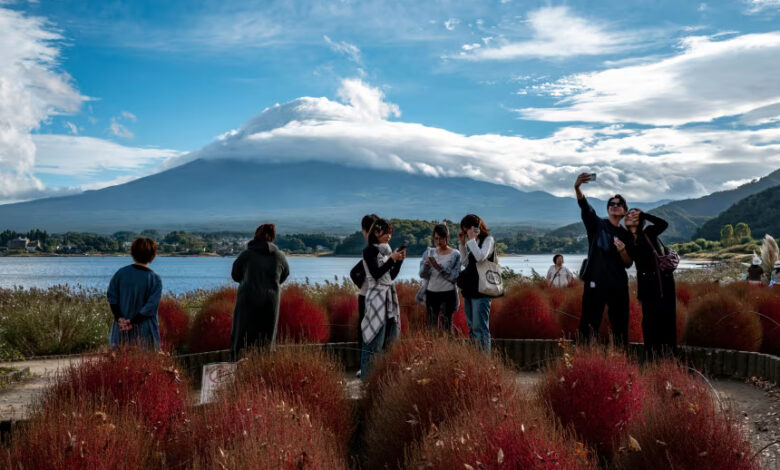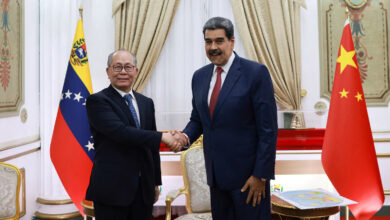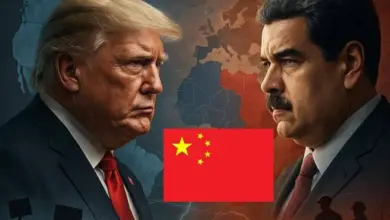
China has warned its citizens against traveling to Japan as it escalates a backlash over comments by the country’s prime minister about the island of Taiwan.
The dictum is Beijing’s most substantive retaliation yet to Sanae Takaichi’s remarks. Even as it may be more symbolic than anything, the move suggests Beijing is willing to wield its economic heft to press geopolitical points, a well-worn playbook.
Recent “blatantly provocative remarks on Taiwan” have “further damaged the atmosphere for people-to-people exchanges… creating additional risks to the safety and security of Chinese citizens in Japan,” a statement published by the Chinese Foreign Ministry said Friday.
The ministry and its missions “remind Chinese citizens to refrain from visiting Japan for the time being,” it said.
The move is Beijing’s latest show of outrage in a roughly week-long row after Takaichi, in response to a question in Japan’s parliament, said that a Chinese attack on Taiwan would count as “a situation threatening Japan’s survival,” and thus could trigger a military response from Tokyo.
Beijing views the self-governing democracy of Taiwan as its territory and has vowed to take control of the island, by force if necessary. For Beijing, Taiwan’s sovereignty is the most sensitive issue in its relations with other nations – a “red line” not to be crossed.
China’s Ministry of Defense on Friday separately warned that Japan would “suffer a crushing defeat” if it dared to intervene militarily in the Taiwan Strait.
Nearly 7.5 million travelers from China visited Japan between January and September this year, by far the highest count of any country or region, according to official data cited by Japanese public broadcaster NHK.
The travel advisory follows official protest from both sides related to the incident – with each country summoning the other’s ambassador – and a surge of vitriolic backlash against Takaichi from within China, where nationalist, anti-Japanese sentiment has been on the rise in recent years.
The falling-out comes less than two weeks after Takaichi and Chinese leader Xi Jinping met for the first time on the sidelines of an international summit and agreed to pursue constructive, stable ties.

‘A heavy price’
The backlash was kicked off by China’s Consul General in Osaka Xue Jian, who last Saturday shared a news article about Takaichi’s remarks and commented “the dirty neck that sticks itself in must be cut off,” in a post on X that has since been deleted.
State media has since published a barrage of scathing commentaries and editorials, while rampant social media discussion has disparaged Takaichi, Japan’s first woman prime minister.
A commentary from the People’s Liberation Army Daily published Saturday attacked Takaichi and said if Japan intervened militarily in the Taiwan Strait, China would give it a “head-on blow.” A PLA-affiliated X account also circulated comments translated into Japanese warning Japan would “pay a heavy price” in such a case.
Tokyo on Friday summoned China’s ambassador to Japan to protest Xue’s “highly inappropriate remarks” and demand Beijing take “appropriate actions,” its foreign ministry said.
Beijing had a day prior summoned Japan’s ambassador to China, in a meeting where Chinese Vice Foreign Minister Sun Weidong said Takaichi’s comments had “seriously damaged the political foundation of China-Japan relations,” and slammed Japan for not retracting them.
Japan’s Foreign Minister Toshimitsu Motegi on Friday said there was no need to retract Takaichi’s comments, stressing that they were made within the context of a discussion on an “existential crisis situation.”
Separately on Friday, Chief Cabinet Secretary Minoru Kihara said “peace and stability in the Taiwan Strait are important not only for Japan’s security but also for the stability of the international community.”
On Monday, Takaichi said her remarks were “hypothetical” and that she would refrain from making similar comments in parliament again.
Previous Japanese leaders have avoided discussing Taiwan in the context of a military response. And Washington deliberately remains vague on how it would respond to a hypothetical invasion, a policy known as “strategic ambiguity.”
Beijing, which is widely seen as aiming to establish itself as the dominant power in the region, looks warily at the American alliance with Japan when it comes to its own regional security and ambitions.
Takaichi has called for closer security ties with the US and last month moved to accelerate the country’s defense build-up, but like previous Japanese prime ministers she must balance the country’s close economic ties to China.
CNN’s Junko Ogura contributed to this report.




